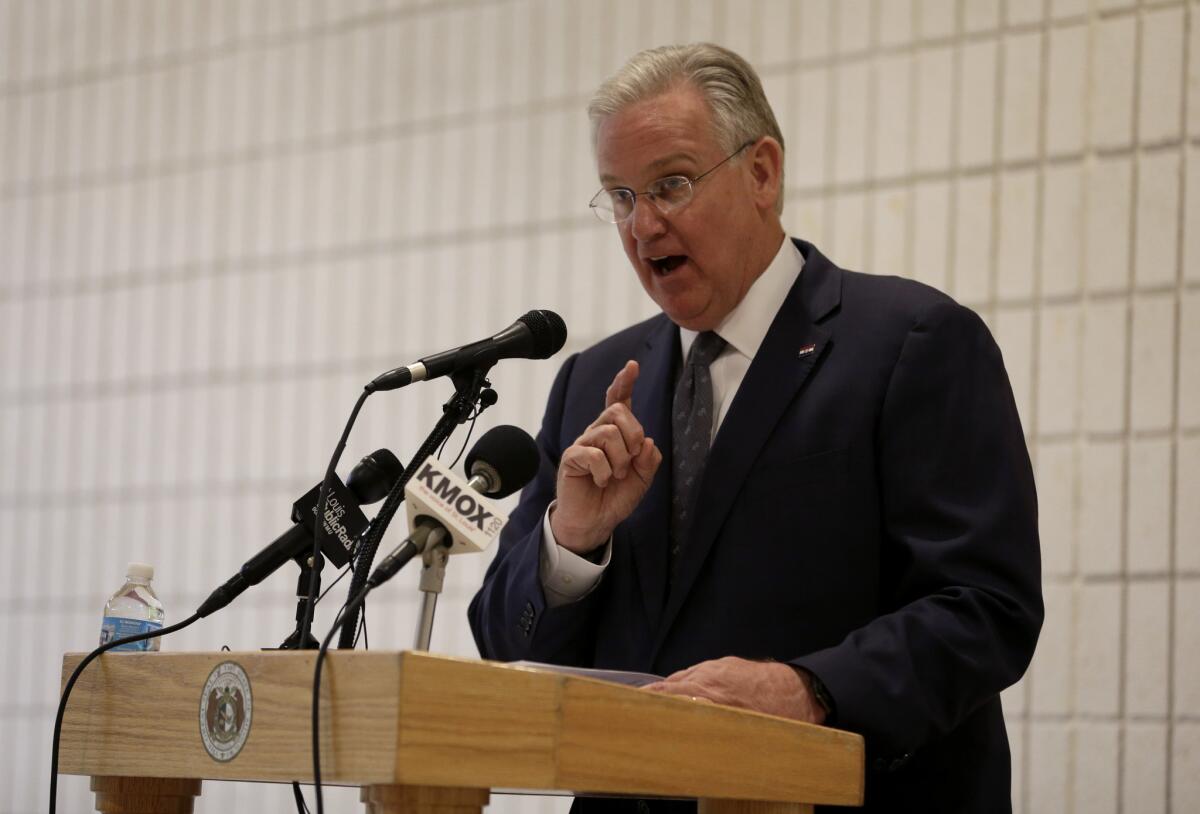Missouri is latest battleground over abortion rights, restrictions

- Share via
In the latest front in the battle over restrictions on abortion rights, it is now up to Missouri’s governor to determine if the state will become the third to require that women wait three days after seeing a doctor before she can choose to terminate her pregnancy.
Gov. Jay Nixon, a Democrat, has not said whether he will sign or veto the bill that won final passage from the Legislature. The House voted 111-39 in favor of the measure Wednesday, sending it to Nixon.
In a statement Thursday, Nixon promised a comprehensive review. “However, it is clear that by failing to include an exception for rape and incest, this extreme proposal would separate Missouri from all but one other state in the nation. I have profound concerns about its impact on women and especially the victims of these heinous crimes,” he said.
Nixon has previously chosen a middle political path, allowing two bills with restrictions on abortions to become law without his signature. One of those measures, passed last year, requires doctors to be in the room for the initial dose of a drug used in medical abortions.
In 1973, the Supreme Court ruled that a woman has a constitutionally protected right to choose to have an abortion, making legal the procedure that was once banned and confined to the dark and dangerous corners of society. Although women have the right, opponents have increasingly pressured state governments to impose restrictions on the procedure.
Opponents of abortion rights often argue that restrictions, such as physician and hospital requirements, are needed to protect a woman’s health. Proponents of abortion rights reply that the restrictions are designed to limit a woman’s options, particularly in rural areas where clinics are often in short supply.
According to the latest survey by the Guttmacher Institute, which studies sexual and reproductive health issues, 39 states require an abortion to be performed by a licensed physician and 20 states require an abortion to be performed in a hospital after a specified point in the pregnancy.
Mandatory wait times are another issue that proponents see as an unneeded bar to a woman’s access. According to Guttmacher, 26 states require a woman seeking an abortion to wait some time, usually 24 hours, before the procedure can be performed. Ten of those states have laws that effectively require a woman to make two trips before an abortion.
If the Missouri bill becomes law, the state would be one of three to require a three-day wait, joining Utah and South Dakota. Missouri only has one clinic that performs abortions, located in St. Louis. So under the new law, a woman would have to spend three days in St. Louis or make at least two trips -- even if she lives across the state -- before getting an abortion.
Democrats have generally been more supportive of abortion rights than Republicans, but that support depends on circumstances. For example, Democrats in Missouri agreed to stop filibustering the bill in exchange for Republicans dropping other measures the Democrats opposed, including one on photo identification requirements for elections.
Supporters of the longer waiting period argue that women need more time to digest information received by a doctor. In addition to the waiting period, Missouri’s abortion law requires doctors to provide women with a variety of written information about the procedure, and they must be given the opportunity to hear the fetus’ heartbeat on an ultrasound.
“Life is precious. I want to make sure the unborn child has a chance to survive,” Sen. David Sater, a Republican pharmacist from rural southwest Missouri, said during debate on the legislation he sponsored.
Opponents argued the bill would also make women pay for expensive hotel visits or drive multiple times to a clinic. “The idea that a woman would not have taken this time already is insulting,” Rep. Genise Montecillo, a St. Louis Democrat, said during the debate, according to media reports.
More to Read
Sign up for Essential California
The most important California stories and recommendations in your inbox every morning.
You may occasionally receive promotional content from the Los Angeles Times.













